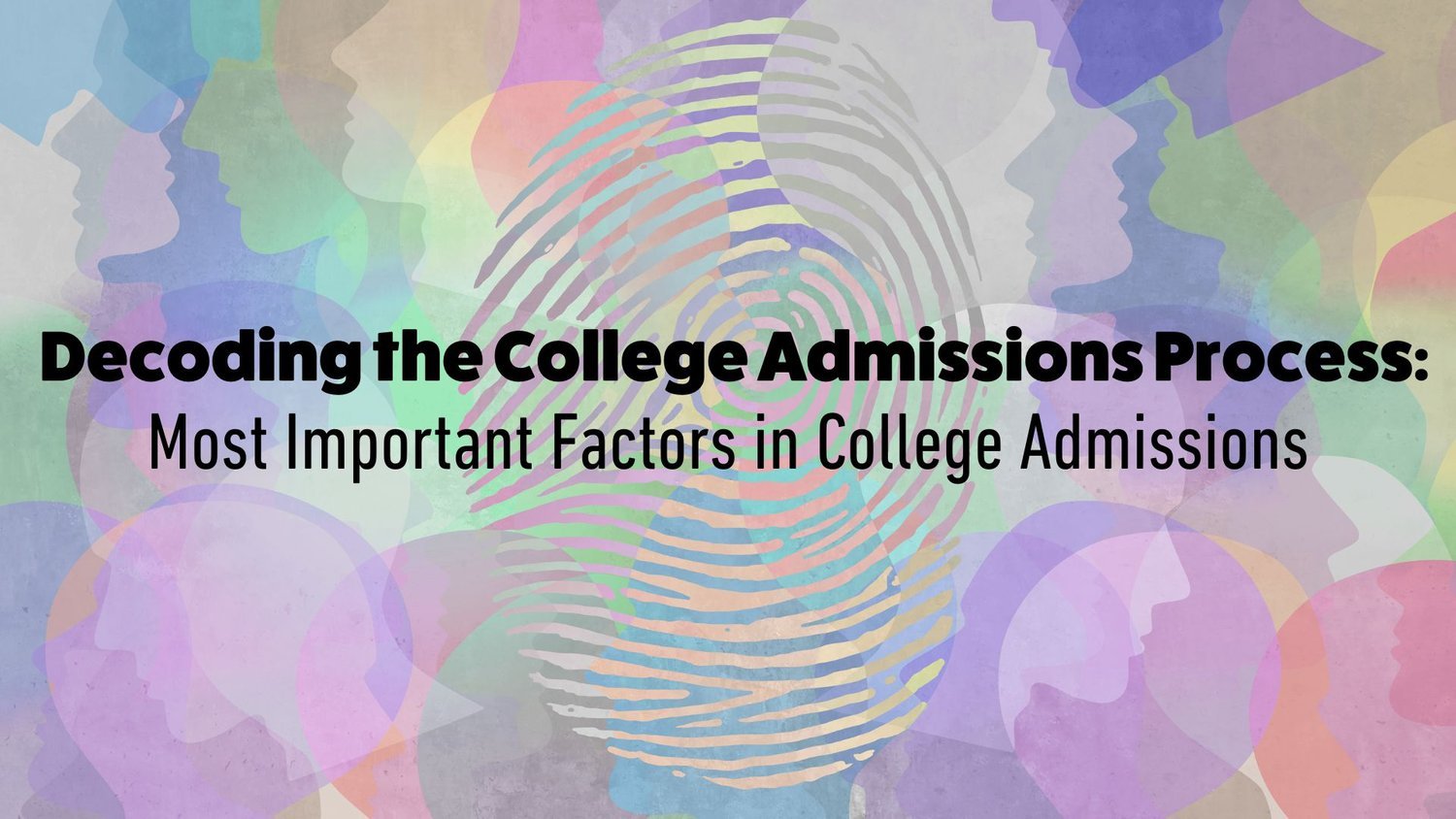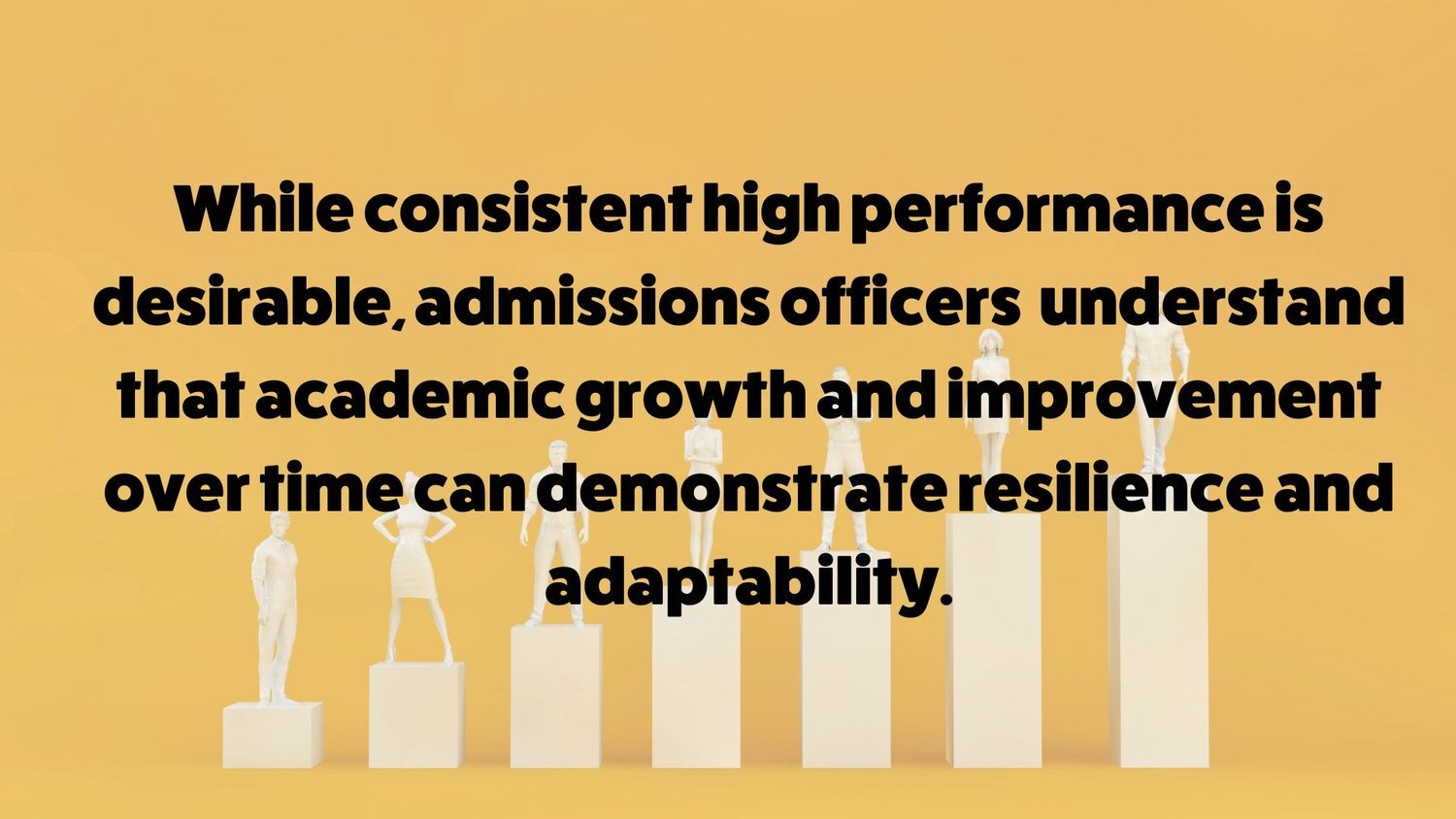Decoding the College Admissions Process: Most Important Factors in College Admissions
The college admissions process is often perceived as a complex and mystifying journey, leaving aspiring students and their families feeling overwhelmed. The abundance of information, advice, and rumors circulating around the topic can make it challenging to discern the most vital factors in securing admission to their dream college. In this blog post, we aim to unravel this enigma and shed light on the most important factors that college admissions officers consider during the evaluation process. By understanding these key elements, students can focus their efforts and maximize their chances of gaining admission to their desired institutions.
Interested in showcasing your intellectual vitality and initiative through an interdisciplinary AI project? Find out how YOU can apply artificial intelligence to the subjects that interest you in InspiritAI’s AI Scholars Program. Additionally, many students who have participated in the AI+X Individual Research Mentorship have gone on to win prestigious awards at various science fair competitions!
Academic Performance
Undoubtedly, one of the most influential factors in college admissions is a student's academic performance throughout high school. Admissions officers carefully assess an applicant's academic achievements and evaluate their ability to thrive in a college environment.
The first crucial aspect considered is the student's Grade Point Average (GPA). The GPA reflects a student's overall performance in their coursework, providing an indication of their consistency and dedication to their studies. Admissions officers pay close attention to both the cumulative GPA and the GPA in specific subject areas, such as mathematics, science, and English. A high GPA demonstrates academic aptitude and a commitment to excellence.
In addition to GPA, the rigor of a student's course load is taken into account. Colleges appreciate applicants who challenge themselves academically by taking advanced courses. This includes Advanced Placement (AP) or International Baccalaureate (IB) classes, which offer college-level curriculum and exams. Success in these rigorous courses indicates an applicant's willingness to push their intellectual boundaries and prepares them for the academic rigor of college.
Admissions officers also consider the trend in a student's academic performance. While consistent high performance is desirable, they understand that academic growth and improvement over time can demonstrate resilience and adaptability. If a student faced initial challenges but showed an upward trajectory in their grades, it can be viewed as a positive sign of their ability to overcome obstacles and excel.
It is important for students to note that while academic performance is significant, colleges also evaluate applicants holistically. They understand that students are multifaceted individuals with various talents, interests, and experiences. Nonetheless, maintaining a strong academic record and challenging oneself academically can significantly increase the likelihood of securing admission to a desired college.
Standardized Test Scores
While the weight given to standardized test scores has been evolving in recent years, they still hold significance in the college admissions process. The most commonly required tests are the SAT and ACT, which assess a student's aptitude and readiness for college-level work.
High scores on these standardized tests can serve as a testament to a student's academic abilities and can differentiate them from other applicants. They provide admissions officers with a standardized benchmark to compare applicants from different schools and backgrounds. Strong scores can demonstrate a student's proficiency in critical thinking, problem-solving, and their grasp of core academic subjects.
However, it's important to note that an increasing number of colleges are adopting test-optional or test-flexible policies. These policies acknowledge that standardized tests may not always accurately reflect a student's true potential or the breadth of their abilities. Instead, colleges place greater emphasis on other aspects of an applicant's profile, such as their academic performance, extracurricular involvement, and personal essays.
Therefore, while high standardized test scores can enhance an applicant's chances of admission, they are not the sole determinant of success. It's essential for students to research individual colleges and understand their specific testing requirements and policies. This way, they can make an informed decision regarding whether to submit their test scores or opt for a test-optional approach. Ultimately, the goal is to present a comprehensive application that showcases the student's strengths and potential for success in college.
Extracurricular Involvement
Beyond academic achievements, colleges value students who have demonstrated a commitment to extracurricular activities. Participation in clubs, sports teams, community service, and leadership roles showcases a student's ability to manage their time effectively, collaborate with others, and pursue their passions outside of the classroom. Admissions officers seek well-rounded individuals who will contribute to the campus community and make a positive impact.
Active involvement in extracurricular activities can significantly enhance an applicant's profile and demonstrate their interests and skills beyond academics. It highlights qualities such as leadership, teamwork, initiative, and a drive for personal growth. Admissions officers appreciate applicants who have dedicated their time and energy to meaningful pursuits that align with their interests and values.
It is important for students to showcase depth rather than breadth in their extracurricular involvement. Rather than joining numerous activities superficially, focusing on a few activities and excelling in them demonstrates dedication and a genuine passion for those pursuits. This depth of involvement allows students to make a more significant impact and develop a sense of leadership or expertise in their chosen areas.
Furthermore, colleges value community service and volunteer work. Engaging in activities that contribute to the well-being of others and the community showcases an applicant's empathy, compassion, and commitment to making a difference. It demonstrates their understanding of social responsibility and their willingness to contribute positively to society.
Overall, active engagement in extracurricular activities provides admissions officers with a broader perspective of an applicant's character and potential contributions to the college community. It is important for students to select activities that genuinely interest them, demonstrate growth and leadership, and align with their personal values and aspirations.
Personal Essays and Recommendations
Personal essays and letters of recommendation are invaluable components of college applications. They provide insights into an applicant's character, accomplishments, and potential for success in college.
The personal essay offers a unique opportunity for students to showcase their individuality and express their voice. It allows them to share personal experiences, reflect on challenges, and articulate their goals and aspirations. A well-crafted essay that is authentic and thoughtfully written can leave a lasting impression on the admissions committee. It allows them to get to know the applicant beyond their academic achievements and extracurricular involvement, providing a deeper understanding of their motivations, values, and perspectives.
Equally important are letters of recommendation, which provide an external perspective on the student's abilities and character. Recommendations from teachers, counselors, or mentors who have worked closely with the student can offer valuable insights into their academic performance, work ethic, leadership potential, and personal qualities. These letters can provide a more holistic view of the applicant's strengths, corroborating the information presented in their application.
It is crucial for students to select recommenders who know them well and can provide meaningful and specific examples to support their claims. Building strong relationships with teachers and mentors throughout high school can ensure that recommenders have a deep understanding of the student's capabilities and can write compelling letters.
Personal essays and letters of recommendation offer an opportunity for applicants to go beyond the numbers and statistics and showcase their unique qualities and potential. By investing time and effort into crafting a compelling essay and cultivating meaningful relationships with recommenders, students can strengthen their applications and present a well-rounded profile to college admissions officers.
Demonstrated Interest and Fit
Colleges seek students who have a genuine interest in attending their institution. Demonstrating interest can be a key factor in the admissions process, showcasing the applicant's enthusiasm and commitment to becoming a part of the college community.
One way to demonstrate interest is through campus visits. Taking the opportunity to explore the campus, attend information sessions, and interact with current students can provide valuable insights into the college's culture, facilities, and academic programs. These visits also offer the chance to engage with admissions representatives and showcase genuine curiosity about the institution.
Engaging with the college through other means, such as attending college fairs or information sessions held in your area, can also demonstrate interest. These events provide opportunities to connect with admissions officers, ask questions, and express your enthusiasm for the college.
In addition to demonstrating interest, it is crucial for applicants to articulate their fit with the institution. Colleges want to ensure that students will thrive academically, socially, and personally within their community. Applicants should thoroughly research the college, its programs, values, and culture. They should then articulate how their goals align with what the college offers and how they envision themselves contributing to and benefiting from the college's unique environment.
By demonstrating genuine interest and a strong fit with the college, applicants can convey their enthusiasm and potential for becoming an active and engaged member of the campus community.
Diversity and Unique Experiences
Colleges strive to create a diverse and inclusive campus community. They value students who bring unique perspectives, backgrounds, and experiences. Admissions officers seek individuals who can contribute to the diversity of the student body, fostering a rich learning environment where different ideas and viewpoints are celebrated.
Students who have overcome challenges or have had exceptional life experiences have the opportunity to stand out in the admissions process. Whether it's overcoming socioeconomic obstacles, advocating for social justice, or pursuing unique passions, sharing these experiences in applications can help students demonstrate resilience, maturity, and a drive for personal growth.
Colleges recognize that a diverse student body enhances the educational experience for everyone. It promotes cross-cultural understanding, encourages dialogue, and prepares students to thrive in an interconnected world. By embracing students with diverse backgrounds, experiences, and perspectives, colleges create an environment that cultivates empathy, tolerance, and open-mindedness.
Applicants should seize the opportunity to highlight the unique aspects of their identity and experiences, emphasizing how they can contribute to the college's commitment to diversity and inclusivity. Colleges value the richness that diverse backgrounds and experiences bring to their campuses, recognizing that a mosaic of perspectives fosters a vibrant and dynamic learning environment.
Interviews
Some colleges offer interviews as part of the application process, either in-person or virtually. Interviews provide an opportunity for applicants to showcase their personality, articulate their motivations, and express their interest in the institution. These interactions also give admissions officers the chance to assess an applicant's communication skills, maturity, and overall fit with the college.
Interviews serve as a platform for applicants to go beyond their written application and present themselves in a more personal and interactive manner. It allows them to convey their passion, enthusiasm, and genuine interest in the college. Through thoughtful responses and engaging conversations, applicants can leave a lasting impression on the interviewer.
While not all colleges require interviews or give them significant weight, performing well in an interview can positively influence an applicant's chances of admission. It provides an opportunity to make a memorable connection with the admissions committee, humanizing the application and putting a face to the name. Adequate preparation, self-reflection, and showcasing one's authentic self can greatly enhance the interview experience and leave a lasting positive impression on the admissions officers.
Special Talents and Achievements
Exceptional talents and achievements in areas such as music, art, athletics, research, or entrepreneurship can greatly impact the admissions process. Students who have demonstrated outstanding abilities in their respective fields can capture the attention of admissions officers. These accomplishments highlight a student's dedication, discipline, and ability to excel beyond traditional academic pursuits. Evidence of passion and excellence can set applicants apart from the competition and enhance their chances of admission.
Colleges recognize the value of students who possess unique talents and have achieved notable accomplishments. These talents can contribute to the college community in various ways, whether through artistic expression, athletic prowess, scientific discoveries, or entrepreneurial endeavors. Students who have honed their skills and made significant achievements demonstrate not only their commitment but also their potential to make a lasting impact.
Applicants should emphasize their special talents and achievements in their application, providing evidence such as awards, performances, exhibitions, or publications. By showcasing these exceptional abilities, students can demonstrate their potential to enrich the campus community and contribute to the college's academic and extracurricular landscape.
Conclusion
While the college admissions process is multi-faceted and highly competitive, understanding the key factors that admissions officers consider can provide students with valuable guidance. Academic performance, standardized test scores, extracurricular involvement, personal essays, letters of recommendation, demonstrated interest and fit, diversity, interviews, and special talents and achievements all play a significant role in shaping a successful college application.
It is essential for students to remember that each college has its own unique criteria and priorities. Therefore, it is crucial to conduct thorough research on individual colleges and tailor applications accordingly. Ultimately, students should focus on presenting their authentic selves, highlighting their strengths, and demonstrating their potential to contribute positively to the college community. By understanding these crucial factors and presenting a well-rounded application, aspiring students can maximize their chances of securing admission to the college of their dreams.
About Inspirit AI
AI Scholars Live Online is a 10 session (25-hour) program that exposes high school students to fundamental AI concepts and guides them to build a socially impactful project. Taught by our team of graduate students from Stanford, MIT, and more, students receive a personalized learning experience in small groups with a student-teacher ratio of 5:1.






